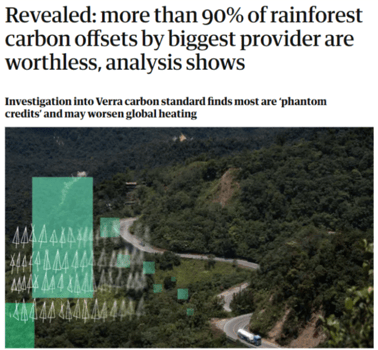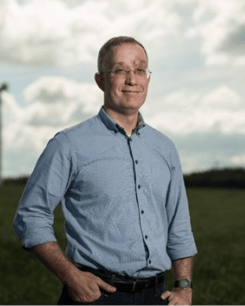Last week, the Guardian published their findings from an investigation into Verra carbon credits, in collaboration with the German daily newspaper, Die Zeit and the non-profit, Source Material. In it, they claimed that 90% of the carbon credits purchased by the likes of Shell, Gucci and Disney were worthless and that the governing bodies had grossly overstated their impact, or in more scientific terms, the ex-ante prediction of potential deforestation may not actually reflect the situation on the ground now.
Whilst not new, the article has become a hot topic for discussion within climate circles, prompting a renewed look at the role of carbon offsets in combating climate change. We spoke to our in-house climate expert and leading environmental engineer, Douglas Marett, who works closely with businesses and governments to help them develop and execute on their climate strategies.
Interview by Alecka Micklewright
Thanks for taking the time out on your train commute to the office Douglas.
We really wanted to get your take on this debate, particularly as someone who sits so closely to the topics brought to light in the article… First up, can you provide a little context?
Douglas: The content in the Guardian article is not new, they have been putting out similar articles for almost two years, and it has been a debate in the climate community for two decades. The specific topic has been covered by a number of journalists and bloggers, and more recently on the John Oliver show. What’s happened is that they’ve all jumped on the same bandwagon, and unfortunately they’ve neglected to communicate some key points to the public, which we’ll get into.

The Guardian, 18th January by Patrick Greenfield
So what is the criticism that they’ve laid at Verra’s table?
Douglas: So, there is one kind of forest related offset called “avoidance” / “avoided reforestation” or “REDD +”. The criticism in the Guardian article is based on what's called the baseline, which is like a reference point to say “what would happen to this forest if nothing happened” - i.e if no money were invested in protecting it, how much of that rainforest would be lost over time. Projecting in this way is a bit like looking into a crystal ball. The actual methodology takes the deforestation history of similar areas and creates a projection of what would happen in the future - but it’s by no means perfect, or particularly accurate. And when you look back at the results, it’s hard to say if the projection was correct in the first place.
...And where do Verra sit in all this?
Douglas: Verra offers the registry and accounting system. This is a hugely important public register because it provides a layer of transparency for organizations like Goodwings that buy and retire offsets for their clients, and thus helps ensure that there is no double counting of the use of offsets by companies. Verra also owns VCS which approves the methodology and sets the standard that all projects need to adhere to. But it’s really the verifiers on the ground that ensure integrity when they present the projects to VCS for ultimate sign off. Of course VCS have the power to say yes or no to a project, but if verifiers say that a project meets the set criteria, why would VCS dispute it?
 |
About Verra
Verra is a nonprofit organization that operates standards in environmental and social markets, including the world’s leading carbon crediting program, the Verified Carbon Standard (VCS) Program. Verra has issued over one billion carbon credits since 2009, which have enabled billions of dollars to be channeled into urgent climate action, sustainable development, and the protection and restoration of ecosystems.
The purpose of Verra's work is primarily to enable finance to reach high-quality activities on the ground. more finance enables more climate action, which is vital to keeping us on track for the Paris Agreement goal.
|
| |
"The avoided deforestation offsets that the Guardian takes aim at is just one type of offsets, and there are over 200 types." |
|
| |
- Douglas Marett |
|
How damaging do you think this is for Verra?
Douglas: I don’t think it’s damaging at all for Verra, because Verra is really the most used voluntary market solution - they’ve cornered the market and they have a lot of other carbon offsets to offer that are of better quality, such as the reforestation / afforestation ones that Goodwings uses. The avoided deforestation offsets that the Guardian takes aim at is just one type of offsets, and there are over 200 types. So the best thing that Verra can do is to underline the variety of offsets available.
And putting Verra aside, who is the biggest loser in all of this?
Douglas: Sadly it’s the climate - the environment.
There is no doubt that these articles have at least temporarily damaged the ability to finance climate change action related to forestry. What they’re doing is singling out the black sheep without even mentioning the rest of the flock, and that’s a problem because the average reader then just writes off carbon offsets as all bad. They’re going after the great at the expense of the good!
| |
"There is no doubt that these articles have at least temporarily damaged the ability to finance climate change action related to forestry. What they’re doing is singling out the black sheep without even mentioning the rest of the flock" |
|
| |
- Douglas Marett |
|
If you were a company reading this article, do you think it would put you off the idea of investing in carbon offsets?
Douglas: I hope not.
Fortunately the business community understands the need for investment in climate action, and this will only increase with the introduction of the new EU Corporate Sustainability Reporting Directive (CSRD) that started this year.
It’s also very necessary - for the last 20 years, we’ve relied on governments to finance the issues around climate change, and we’ve maxed out on that now, so the private sector needs to scale up in their own commitments to accelerate action in and outside their value chain.
We know that businesses need to take responsibility for their emissions, but what, in your opinion, is the best course of action?
Douglas: Personally I think the first thing for companies to do is do their due diligence. Instead of simply neutralizing their impact with offsets, they should create an internal price of carbon (ICP) so they commit to setting aside a budget for climate investment. For example, if a company has emitted 10,000 tCO2 during their business year - they would place a price on each tonne and spend a portion of that budget on internal efforts to reduce emissions, and the rest on investing in climate solutions that address the biggest global pain points, or technologies (like biofuel) that need more capital to scale.
But let’s be clear - offsetting should not be seen as a “get out of jail free card”, right?
Douglas: Absolutely not. Carbon offsets should be seen as an investment in the future - in climate action, not simply a get out of jail free card as you say. The narrative needs to change and we all have to take responsibility. The good news is that businesses are well positioned to do this and most actually have both the money and collective power to do this to great effect.
Finally, what is the future for carbon offsetting? Does it still have a role to play in fighting climate change?
Douglas: We have to look at all the solutions that are available to us, and reforestation / afforestation is critical, as is the need to protect existing forests - there’s simply no doubt. One thing is we’re losing forest cover because of deforestation - between 2000 and 2021 the planet lost 11% of global tree cover, which has released around 176 GtCO₂ into the atmosphere.
The second thing is that the IPCC has said that up to 30% of the global mitigation needed for the Paris Agreement 1.5° C or 2° C pathway towards 2050 should come from AFOLU (Agriculture, Forestry and Other Land Use). And it’s not just about climate change, it's also about protecting biodiversity. Noting that this is just one of the big global pain points.
Thanks so much for taking the time to talk to us Douglas - it’s so great to get your perspective on these types of debates.
Douglas: My pleasure. Have a great day.
|

|
About Douglas Marett
Douglas is an environmental engineer, the CEO of GH Sustainability, and the founder of Enablesus. With nearly two decades of experience working in climate change and helping several national governments with their climate change commitment, Douglas is an expert in transparency, corporate sustainability, and GHG reporting.
|
